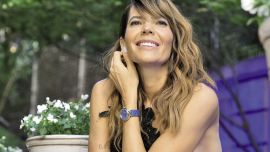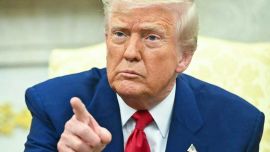This week Matías Lammens has more reason than ever to sing the 1934 George Gershwin song “I Got Plenty of Nothing.” With no professional football played in this country since Rosario Central versus Colón last Monday night (and none likely for weeks to come) and with all intercity transport banned for this upcoming long weekend at all odds with this government’s creed of domestic tourism promotion, his Tourism and Sports Ministry is looking totally hamstrung. Few things are more opposed to the escalating quarantine ethic than the “passion of multitudes” or mass tourism.
Arguably the hardest-hit casualty of coronavirus in the Cabinet in terms of the activities covered, this portfolio thus emerges as the most topical choice for today’s “Ministry Positions” column – the Health Ministry would be the obvious candidate, followed by Education with the suspension of classes announced last Sunday, but both have been analysed in previous columns. The original aim had been to look at sports much closer to the Tokyo Olympics but these now risk the fate of the 1916, 1940 and 1944 Olympics – javelin-thrower Braian Toledo (the victim of a tragic road accident three weeks ago) might not be the only athlete denied the chance of medal glory.
Let us start with the minister. Political novice Matías Daniel Lammens Nuñez, 39, president of San Lorenzo de Almagro football club from 2012 until his entry into the Cabinet, is widely perceived as being awarded the Tourism and Sports Ministry as a consolation prize for last year’s uphill electoral battle against Buenos Aires City Mayor Horacio Rodríguez Larreta, although seven years running the Pope’s favourite club should give him some credentials for the Sports half of his portfolio at least. Yet he owed his San Lorenzo presidency not so much to Pope Francis as to media tycoon and close friend Marcelo Tinelli. His Cuervos years were a success, winning the club its first Libertadores Cup in 2014 and restoring it to financial solvency.
Politically, Lammens is one of the most independent Cabinet members. His relationship with the Mauricio Macri administration in its more successful early years especially was sufficiently cosy to be offered the presidencies of ANSES social security and Banco Nación, although he became increasingly disenchanted. Yet he also insists that the Frente de Todos coalition must represent a new and broader movement rather than any throwback to a Kirchnerite past.
The twinning of tourism and sports runs a close second to the brand-new Women, Gender and Diversity Ministry as the baby of all portfolios – it totals 154 days of existence as against 102 for the latter. The difference is due to a brief Tourism, Culture and Sports Ministry created in 2001, right at the end of the doomed Fernando de la Rúa presidency under Hernán Lombardi (who was actually far more interested in culture than the other two areas). In 2010, then-president Cristina Fernández de Kirchner thought that the Bicentenary justified promoting the Tourism Department back to a Ministry – throughout the Kirchner years (2003-2015) tourism was under Enrique Meyer (transplanted from the family heartland of Santa Cruz like several ministers). In 2015 Macri tapped Córdoba Radical Gustavo Santos for this ministry as part of a balancing-act with his senior coalition partners before demoting him to secretary with under 300 employees in the last 15 months of presidency – in any case Macri’s main gift to tourism, the advent of low-cost airlines, was the work of Guillermo Dietrich’s Transport Ministry, not Santos.
In the previous century tourism was left entirely to the private sector until 1942. “Social tourism” (after introducing paid holidays for workers and creating Chapadmalal resort for them) was very important to the first Peronist government. In most succeeding years tourism was a subdivision of transport. An official state agency for sports was the product of the second Peronist government (in the last three months of Perón’s life in 1974) – today the Sports Secretary under Lammens is ex-Leona hockey star Inés Arrondo, the first woman to occupy that post, following a short-lived attempt by Macri to reprivatise sports organisation.
Any comment on tourism today is necessarily abstract in view of the coronavirus vacuum but it has several virtues to recommend it – among all Argentina’s potential money-spinners it is the most federal, the cleanest and the most labour-intensive. Argentina is an over centralised country by common consent but not where tourism goes. This metropolis is a great place to live (as this columnist can attest after 32 happy years here) but, let’s face it, does not offer abundant sightseeing for the tourist passing through – is the Obelisk really all that marvellous? Just to name examples from three extreme ends of the country, the Iguazú waterfalls, the Perito Moreno glacier in El Calafate and the Tren de las Nubes in Salta are all spectacular with numerous points of attraction for the tourist in between – often enough the poorest provinces have the most to offer.
There is a vast consensus among the experts that energy, agriculture and mining are the key sectors for securing the dollars now so much at a premium but all three are dirty words in environmental terms (between fracking the shale of Vaca Muerta or “dead cow,” the flatulence of live cows and the lavish use of cyanide). By way of contrast preserving nature is in the direct self-interest of much of the travel industry – by far the cleanest way of netting hard currency (not that the massive disruption of international aviation encourages immediate prospects).
Tourism is also labour-intensive, accounting for 9.4 percent of all employment in Argentina – these jobs are distributed almost nationwide also offering work at virtually every level of skill ranging from tour operators and guides to cooks and baggage-handlers, even incorporating ordinary citizens beyond the sector via the increase in Airbnb accommodation (even if potentially at the expense of the hotel industry). Since tourism generates one job out of every five worldwide, there is scope to double these employment levels but for some time to come Covid-19 will stand in the way of Lammens and his Tourist Promotion Secretary Yanina Martínez.
Space is now running short to write much about sports, along with a certain reluctance to trespass on another section of the newspaper – let such questions as total suspension versus playing in empty stadiums be debated elsewhere.
The Tourism and Sports Ministry is a fun portfolio which is also a potential goldmine but only three months down the road faces a spiralling pandemic. Lammens might want to go further back in time than Gershwin to quote Hamlet: “The time is out of joint – O cursed spite,/That ever I was born to set it right!”




















Comments